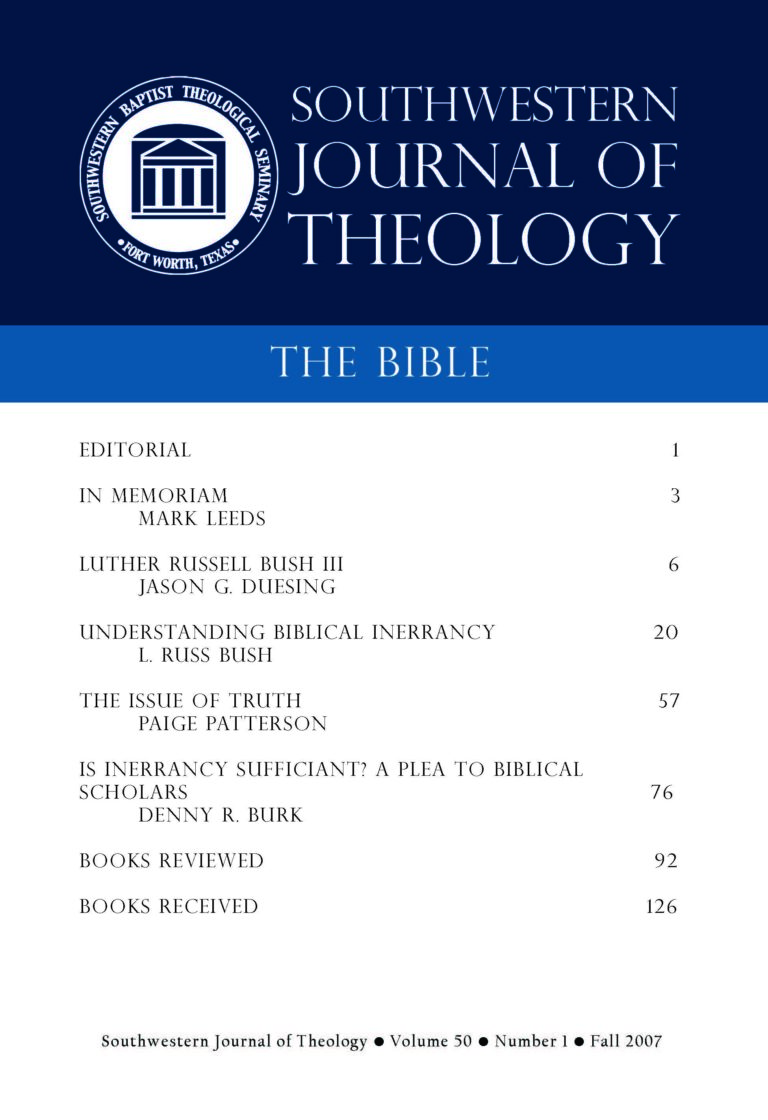
The Bible
Southwestern Journal of Theology
Volume 50, No. 1 – Fall 2007
Managing Editor: Malcolm B. Yarnell III
Edited by Ian M. Randall, Toivo Pilli, and Anthony R. Cross. Studies in Baptist History and Thought, vol. 19. Milton Keynes, UK; Waynesboro, GA: Paternoster, 2006. 357 + xx pages. Softcover, $38.00.
This book is a compilation of papers presented at the third International Conference on Baptist Studies held in Prague. Consequently there is a great diversity of both subject matter and locale. It discusses aspects of the Baptist experience from the middle of the seventeenth century to the present day. Baptists from the Philippines, India, Zimbabwe, Latvia, France, and Germany all give expression to their understanding of Bap- tist identity, alongside better known formulations from Britain and North America.
A valuable aspect of the book is the insight it provides into Baptist history and theology in a large number of contexts. While knowledgeable American readers will doubtless know about Hanserd Knollys and the early Particular Baptists in England or William B. Johnson and the founding of the Southern Baptist Convention, far fewer will know about Julius Köbner and pioneering Baptists in nineteenth century Germany or Godhula and the founding of Baptist churches among the Naga people of India. Some authors endeavor to tell the entire history of Baptists in a particular nation or area. Within this book can be found good introductions to the history of Baptists in Wales, Latvia, Australia, Zimbabwe, and the Maritime Provinces of Canada. Other authors examine the currently evolving state of Baptist theology and identity in a specific context. One can learn how Baptists in France have responded to the growth of the charismatic movement, how Filipino Baptists shape much of their identity around worship practices, or even how one Scottish Baptist church has called pastors. Yet other authors delineate the impact of an individual on Baptist identity. Alexander Campbell is examined to see how Baptists formulated their identity in response to him, while consideration is given to Walter Rauschenbusch’s thoughts on what it means to be Baptist. Finally, some authors engage a particular historical issue such as Baptist devotional practices in eighteenth century England, developing concepts of religious liberty in the nineteenth century, or Baptist responses to the Montgomery, Alabama bus boycott of the 1950s.
From a historical perspective, the book can be a mixed bag. Most of the authors are conscientious and cautious historians who are trying to draw out what different Baptists believed and how that impacted their identity. There is a particular effort by many to draw on the larger cultural context of a given nation and examine how Baptist identities were changed by it. For example, Sébastien Fath considers the historical and sociological context of French Baptists before examining the relationship of different Baptist communities to the charismatic movement (78–83). A thoughtful consideration of the relationship between the extra-theological forces of society and culture and theological development is commendable. Students of Baptist history and theology will find many excellent examples of such research in this book. Unfortunately, not every writer manages to conceal their own biases. Kenneth Roxburgh uses the supposed theological openness of William B. Johnson to challenge the current theological direction of the Southern Baptist Convention (152). William Pitts gives a detailed case study of a Southern Baptist church moving in a progressive direction by ordaining female deacons (199–210). Li Li praises the International Mission Board for its efforts in China while Henry Mugabe expresses frustration with IMB policies in Zimbabwe where it has not yet allowed Zimbabweans to gain control of significant mission assets (253, 305, 310). However, most of the authors do not venture beyond describing what their fellow Baptists have believed or currently believe to begin describing what certain Baptists should believe.
More troubling than the historical perspective offered by some of the authors is the attitude toward culture that is too often exhibited. Some authors reflect the idea that there is a trans-cultural biblically-based essence of Baptists, although its exact expression in different cultures can be highly varied. Others, however, take a more accommodating approach to culture. Important points of belief and praxis are defined by cultural norms, with very little critical reflection. While it is undoubtedly true that the larger cultural context can play a major role in the self-understanding of people and their consequent religious identity, it is also true that a failure to examine critically one’s culture in light of biblical teaching can lead one far away from a biblical faith. Baptists are no exception and a few of the authors seem dangerously close to falling into this trap.
Despite the shortcomings of a few, this remains an excellent book. It approaches the complex subject of Baptist identity from a variety of angles that is difficult to find elsewhere. The individual studies will be valuable to researchers and some can serve as introductions to entire fields of research. As a whole, the book will provide students of Baptist history and theology a broad understanding of the dynamics found among Baptists around the world. That in itself commends it.





